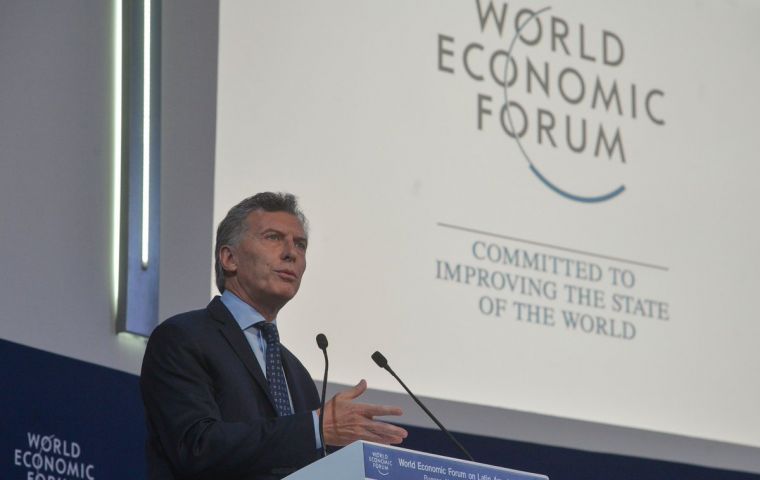MercoPress. South Atlantic News Agency
Argentine Senate approves tax reform and 2018 budget; economy expanded 0.2% in October
 Last week Congress approved Macri’s pension reform plan, part of his campaign to cut Argentina’s fiscal deficit to 3.2% of GDP from 4.2% currently.
Last week Congress approved Macri’s pension reform plan, part of his campaign to cut Argentina’s fiscal deficit to 3.2% of GDP from 4.2% currently. Argentina’s Senate on Wednesday gave final approval to the government’s tax reform and 2018 budget plan, part of President Mauricio Macri’s push to cut business costs and attract investment to Latin America’s No. 3 economy.
Macri was elected in late 2015 with a mandate to free the markets by ditching the heavy controls put on the economy by the previous government. The 2018 budget bill foresees economic growth of 3.5% and average inflation of 15.7%.
Last week Congress approved Macri’s pension reform plan, part of his campaign to cut Argentina’s fiscal deficit to 3.2% of GDP by the end of 2018 from 4.2% currently.
The pension reform debate prompted violent protests outside of Congress and a 24-hour general strike by labor unions that accuse Macri of cutting benefits to already-struggling pensioners while lowering corporate income taxes.
Argentina's economic activity expanded 5.2% in October compared with the same month last year, government data showed on Wednesday, bringing the country closer to the level that would trigger a payout of growth-linked bonds.
South America's No. 2 economy expanded a cumulative 2.8% in the first 10 months of the year, government statistics agency Indec said.
Growth of more than 3% this year would prompt payouts of more than US$2 billion on gross domestic product (GDP) warrants issued as part of debt exchanges in 2005 and 2010 following Argentina's massive default in 2002.
Confirmation of whether or not the government will pay will not come until the final 2017 GDP figure is revised in the second half of next year.
The economy grew 0.2% in October compared with September, the data showed. Growth was driven by an 18.8% expansion in construction activity, 6.8% growth in wholesale and retail commerce, and a 4.3% increase in manufacturing output.
This year's recovery, following a deep recession last year, helped President Mauricio Macri's coalition sweep legislative elections in October, providing a boost to his business-friendly reform agenda following more than a decade of populist rule.




Top Comments
Disclaimer & comment rules-

Read all commentsWhat Macri and his team of CEOs is doing is very simple:
Dec 30th, 2017 - 12:56 am 0They are borrowing like crazy and attract lenders by paying unmatched interest rates. From about USD 160 billion owed in Jan. 2016, foreign debt has gone up to about USD 216 billion in July 2017.
https://tradingeconomics.com/argentina/external-debt
They use part of the borrowed money on public works projects that mean good business for friendly entrepreneurs and give an impression things are somehow working.
They are shrinking taxes for the rich and reducing the income of the most vulnerable, starting with retirees and children and aiming to all workers in the coming steps.
They are shrinking the domestic productive sector by killing small and medium size enterprises that can't or won't bother to compete with imported merchandise.
Even friendly economists are warning the Macri government that the country is running to a crise of unprecedented proportions.
No worries, Macri says: We'll borrow some more.
That is why a package of laws changing the way retirees' pensions are updated, how the state finances itself through taxes and how employees are contracted and compensated are being pushed through without any such thing as a compromise.
That is why things aren't looking good for opponents to this forced regression.
Commenting for this story is now closed.
If you have a Facebook account, become a fan and comment on our Facebook Page!